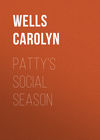Читать книгу: «Vicky Van», страница 6
CHAPTER X
THE INQUEST
The inquest was in progress. In the coroner's courtroom inquiry was being made in an endeavor to discover who was responsible for the death of Randolph Schuyler. The funeral of the millionaire had taken place, and the will had been read, and now the public awaited news of the action of the police in placing the crime and producing the criminal.
The case had become a celebrated one, not only because of the prominence of the victim, but because of the mystery surrounding the young woman suspected of the deed of murder.
Many voluntary witnesses had come forward with additional information regarding Victoria Van Allen, but none of these knew anything more of her relatives or progenitors than I did myself.
Some of these were asked to testify at the inquest, but more were not so called on, as their testimony was in no way material or vital.
I did not propose to attend all the sessions, myself, but I wanted to hear the opening queries and learn just how the case was to be managed.
Doctor Remson told of his examination of Mr. Schuyler's body and testified that death was practically instantaneous as a result of a single stab of the short, sharp knife. The knife was produced and identified. It had been carefully taken care of and had been photographed to preserve the faint fingermarks, which were on its handle, and which might or might not be the prints of the murderer's fingers.
The caterer Fraschini told of his orders for the party supper, and of the sending of his best and most faithful waiters to attend to the feast.
Luigi, the head waiter, again went over his story. I had heard this twice before, but I listened with deep interest, and I realized, that, granting the truth of his recital, there was no room for doubt of Vicky Van's guilt.
I hadn't of course, told of seeing her take her mail from the box that night, nor of her talking to me over the telephone. Should absolute law and justice call for that information, I might give it up, but at present, I was awaiting developments.
Vicky had sent me her mailbox key, and I had received it duly, by mail. It was not sent by parcel post, nor was it registered—these would have called for the sender's address—but, sent by ordinary first-class letter post, the flat little key came duly and promptly.
I had not used it yet, the time was not ripe until that same night, and I intended to say nothing of it, until I had fulfilled my promise, if, indeed, I ever told of it.
But Luigi's story as I heard it again made me shiver with apprehension. Surely, since he saw Vicky right there at the moment, bending over the victim, blood stains on her gown, there could be no loophole of innocence. Had the murderer been some one else, and had Vicky known it, she must have made an outcry—must have accused the guilty party. There was no one whom Vicky loved well enough to wish to shield. And, too, the guests were all in the big living-room; there was no one unaccounted for. If Luigi himself, or any of the caterer's men had by chance done the deed, Vicky wouldn't have run away! There was no sense in that. So I could see no possible theory but that of Vicky's actual guilt. Why she did it, was another story. She may have known Schuyler before, might have known him a long time, might have had her own reasons for wishing him dead; but all that was outside the issue of her criminality. There was no eyewitness of the stabbing itself, but Luigi's presence on the scene an instant later, left no room for question as to the hand that had held the knife.
The jury seemed to think this. Gravely the men listened to what the
Italian told, and their faces showed what they believed.
Then came the guests of the party. One after another, they told the same story. All knew Vicky fairly well, as a pleasant acquaintance; all liked her as a good friend; all enjoyed her as a delightful hostess; and many told individual instances of Vicky's kind heart and helping hand. Not infrequently had she lent assistance, both financial and in other ways, to these friends of hers. Never, they all said, had they known her to do a mean or deceitful act or to say an unkind or malicious word.
The men spoke of her as a gay, light-hearted butterfly girl, who was a coquette, but who stopped short of a real flirtation; the women gave her such commendation as is rarely given them to their own sex, and declared that Miss Van Allen was a simple, kindly, generous nature without a trace of the disposition which causes a woman to be dubbed a cat.
Norman Steele was present. He explained his sudden departure from the party by the fact that he had to catch an owl train for Chicago. He said, further, that Randolph Schuyler had asked him to take him around to Vicky Van's, as he wanted to meet her. But he had asked Steele, especially, to introduce him as Mr. Somers. He had given no reason for this, and Steele had thought little of it. Randolph Schuyler was a man whom his friends obeyed, often without question. I understood this. Steele was no more of a toady to the millionaire than most men would be; but a request of Randolph Schuyler's was not to be thoughtlessly refused, so Steele acquiesced.
He was reticent in further dilating on Schuyler's character. Said he often called on ladies who could not be called exclusive, but denied knowledge of definite cases or names.
On the whole, Steele's evidence didn't get us anywhere. We already knew that Schuyler had gone to Vicky Van's under an assumed name. The reason for this had little, if anything, to do with what had followed. A connection of some sort, between Vicky and Mr. Schuyler must be traced, in order to arrive at her possible motive. A woman does not stab to kill a chance guest whom she has never met before!
Bert Garrison came next. His talk ran mostly to eulogies of Vicky. The poor fellow was dead in love with her, and had been for many moons, but though Vicky favored him more than some others, yet she gave him no definite encouragement, as he himself ruefully admitted. But he made a desperate effort to show that a girl of Victoria Van Allen's high character and fine qualities would be incapable of a base deed.
The coroner smiled a little at Garrison's vehemence, and let him run on for a time, in praise of the absent Vicky.
At last, he said, "And, why, then, Mr. Garrison, in your opinion has
Miss Van Allen disappeared?"
"The disappearance is not of her own volition," declared Garrison; "she has been taken away by somebody and held against her will, in order to make her appear guilty."
This was a new theory. I might have given it serious consideration had I not had speech with the girl herself. It couldn't be that Vicky was held captive, since she was at her own house two nights after the crime. But I could see that the jury, and even the coroner and detectives were interested in this idea.
"By whom could she possibly, or theoretically, he thus held?" the coroner asked.
"I don't know. But assuming some intruder effected an entrance and stabbed Mr. Schuyler, if surprised during or after the act by the sudden appearance of Miss Van Allen in the dining room, he might in some way have gotten her out of the house, and still be keeping her in a hiding-place."
It was perhaps, a possibility, but I didn't see how any intruder could do all that, without being seen by the waiters. Unless, perchance, the waiters had been bribed to silence. And that, in the face of Luigi's earnest, and convincing testimony, I could not believe.
It was a fantastic theory, evolved in the brain of Garrison, for the purpose of diverting suspicion from Vicky Van. However, it seemed to impress the coroner, and he made notes as he dismissed the witness.
Cassie Weldon added one bit of new information. She said, though with evident reluctance, that she had caught a mere glimpse of somebody running upstairs, just before the waiter had come to call for help.
Cassie had not wanted to testify at all. As she had intimated to me, it was detrimental to her work as a concert singer to be mixed up in this affair. But since she had to give her testimony, she apparently felt it her duty to tell the whole truth.
"How could you see the stairs from the living-room?" asked the interested coroner.
"I was near the door, and though I was not looking out into the hall, I had a vague, fleeting impression of somebody running upstairs. I paid no attention to it, of course, but I am sure somebody did."
"A man or a woman?"
"A woman. That is, I was conscious of a flutter of skirts, but I am not sure it was Miss Van Allen. I didn't see her clearly enough even to notice the color of her gown. It was merely a glimpse of some one flying round the newel post and up the stairs. It might have been a stranger."
"You mean, if there were some intruder, it may have been a woman, and not a man?"
"I don't know, I tell you. I can only say I know somebody ran upstairs. Further than that, I've no idea concerning it."
"It must have been Miss Van Allen," said the coroner, decidedly; "had it been any other woman, and had she stabbed Mr. Schuyler, Miss Van Allen would not have disappeared. Now, if this woman who ran upstairs was Miss Van Allen, she effected an escape from the upper stories. Is there a skylight exit?"
No one seemed to know, as no one had thought of Vicky Van leaving her house by such means.
But to me, the idea was ridiculous. A girl, in elaborate evening gown, clambering out of a skylight trap-door, to where? Not to a neighbor's, for Vicky Van knew none of the nearby residents. I had heard her say so, myself. And had she descended into a strange household, and begged for shelter, it would have become known before this.
Well, anyway, the detective Lowney immediately sent an order to have the skylight matter looked into and the proceedings went on.
Ariadne Gale was closely questioned as to how she knew of the picture in the back of Randolph Schuyler's watch. But she declared that he had shown it to her during their conversation that evening.
"I never saw the man before," said Ariadne, who unlike Cassie Weldon, rather enjoyed the publicity of the occasion. "I chanced to be about the first girl he was introduced to, when he came into the house. And we had a chat, and when I chaffed him a bit on his dignity and awe-inspiring presence, he refuted it by showing me the picture in his watch. He said it was a little chorus girl he had taken out to supper the night before. I could see the picture had been merely tucked in temporarily, it wasn't neatly pasted in, as a watch-case picture usually is, and then I chaffed him on his fickleness. Our conversation was the merest foolery, and a moment after, he went over to be presented to Miss Van Allen."
"You think they had never met before?"
"I'm sure they had not. They looked at each other with the conventional politeness of strangers, I know Miss Van Allen well, and she is not one to dissemble or pretend. I am sure she had never laid eyes on that man before. She simply couldn't have killed him!"
Ariadne's further evidence amounted to nothing, nor did that of several other of the party guests who were called on.
Except Mrs. Reeves. She knew more of Vicky's home life than any of the rest of us, but even she knew nothing of the girl's origin.
She had first met her at one of Miss Gale's studio parties, and had taken a fancy to her at once.
"Where did you first meet her, Miss Gale," the coroner interrupted to ask.
"She came to my studio to look at my pictures," was the reply. "She admired them, and bought one. She was so pleasant and so interested in my work that she came two or three times, and then I invited her to one of my little studio affairs. She quickly made friends, and she invited us to her house. I went there first about two years ago."
"So did I," Mrs. Reeves resumed. "And since then, I have been there frequently, and every time I saw the girl I liked her better. But she was always a bit of a mystery. I confess I tried at times, to learn something of her previous life. But she adroitly evaded my questions, and cleverly changed the subject. I think, however, from chance hints she let drop, that her home was somewhere in the Middle West."
"An indefinite term," observed Coroner Fenn.
"It's all I know."
"Where did Miss Van Allen go on her frequent absences from her home?"
"That I don't know, either. Often she'd be away a week, and on her return would tell of a gay house party down on Long Island or a week-end trip up Westchester way, but I don't remember any definite place she visited."
"I do," piped up Ariadne. "She often goes to Greenwich, Connecticut, and to Bronxville. I've heard her tell of these trips. She has a wide circle of acquaintances and, of course, she's a favorite with all who know her."
"I have a piece of evidence," resumed Mrs. Reeves, "which I daresay I ought to exhibit. It is a letter from Miss Van Allen, which I received only this morning."
This caused a sensation. A letter from Vicky Van! Just received! I found myself trembling in my shoes. And I asked myself why. Was I afraid the girl would be caught? Did I want to shield a felon? And I had to admit to myself that I did. I wasn't in love with Vicky Van, but I had a tremendous interest in her, and I didn't want that little lone, helpless person haled before a court of justice. Vicky did seem terribly alone. Hosts of friends she had, but no one who was in any way responsible for her, or in a position to help her. Well, if she ever returned, voluntarily or perforce, she would find a friend and champion in one Chester Calhoun, of that I was certain!
Mrs. Reeves handed her letter over to the coroner, and he read it out.
It ran:
My dear Mrs. Reeves: You have always been such a good friend to me that I'm writing you just a line. You are everything that is good and kind, and now I'm going to ask you as a final favor to forget Vicky Van at once and forever. I am going away and I shall never return. Don't think of me any more hardly than you must, but if you can keep any loving little memory of the hours we spent together, I want you to do so. And as a remembrance, I want you to have my little electric coupe. It is in Rennard's garage, and I have written him to turn it over to you. I shall miss our happy times together, but—I can never come back. Do not worry about me, I am safe. And I am your affectionate Vicky Van.
"You are sure this is from Miss Van Allen?" asked Fenn.
"Oh, yes," replied Mrs. Reeves. "There's no mistaking that writing."
Nor was there. I knew Vicky's penmanship, and it was most peculiar. Never have I seen such a hand. Angular, slightly backhanded, and full of character, it would be difficult to imitate it, and, too, no one would have any reason to forge that letter to Mrs. Reeves. She had verified Vicky's statement, and found that a letter to the garage owner had instructed him to give up the car to Mrs. Reeves, and he had already done so, that very morning.
The letters had both been mailed in New York the night before, the postmark showing that they were mailed in the district that included Vicky's residence.
Was she, then, even now in hiding near her home? Or, had she sent the letters to be mailed by some one else? By Julie, perhaps, who, I felt sure, was with her mistress, wherever that might be.
My leaping thoughts took in all this, and by degrees the slower going coroner, put it in words.
Lowney, the detective, bristled with interest. A clue, he had, he thought, but what a clue! Two letters posted in the city. What did they show of the whereabouts of the missing girl?
Lowney scrutinized the one to Mrs. Reeves. Ordinary paper, such as might be bought in any stationery or department store, no monogram or initial on it, nor was there any maker's name under the flap.
But a dozen people present testified to Vicky's handwriting, and the coroner eagerly took possession of the letter.
Sherlock Holmes, I thought to myself, would read that letter, look at it through his good old lens, smell it, and then walk out, and return in a half hour, with Vicky Van in tow!
But for my part, I could see nothing illuminating in that plain paper and envelope, and the letter in the well-known penmanship.
All I gathered was, that wherever Vicky was, she was not only safe but comfortable. The tenor of the note breathed leisure and composure. Clearly, she was not breathlessly hurrying from one place to another, or vigilantly eluding pursuit. She was at ease, with opportunity to indulge in thoughtful kindness to a friend, and to write at length about herself.
At length, yes, but with no hint of her hiding-place nor any clue to it. Poor little Vicky! She seemed so alone—and yet—how did I know? She may have gone to friends or—somehow I hated to think that she had any man who was her legal—or even willing protector.
Yet she said she was safe, and her letter showed no fear of the future. And then again I was stabbed by the thought that perhaps there was no earthly future for Vicky Van. I didn't want her to kill herself—I didn't want her to be found and arrested—what did I want? I wasn't sure in my own mind, save that I wanted her safety above all else. I suppose I believed her guilty—I could believe nothing else, but even so, I didn't want her brought to bay.
I gave my own testimony, which was all true, and all frank, except that I said nothing of my nocturnal visit to Vicky's house or of our telephone conversation. If my conscience smote me I combated it with my chivalry, which would not allow me to betray a woman into the hands of the law.
The later witnesses, who were mostly the working people whom Vicky employed by the day, told nothing of her or of her home life. They all spoke of her as a kind lady to work for, though, as a rule, they had not seen her, but had been engaged, directed and paid by the maid, Julie.
It seemed to be tacitly assumed that wherever Vicky was Julie was with her. I had had this information from Vicky herself, but others took it for granted, in the absence of any reason to think the contrary.
The whole day's session, to my mind, achieved little of useful information. Mrs. Reeves' letter proved conclusively that Vicky was aware of the search being made for her, and showed her determination not to be found. It was Saturday, and when the inquest was adjourned until Monday morning, I couldn't help feeling that it might as well have been permanently adjourned, for all the further conclusions it would lead to.
I went home at last, thrilling with the thought that that night I was to get Vicky's mail from her box and hide it where she had directed. I secretly hoped she might be in the house herself, waiting for it, but scarcely dared believe this would be the case.
CHAPTER XI
A NOTE FROM VICKY
Nor was it. I had secured a latch-key to the house, from the police, who were willing enough for me to search for possible clues, as I had told them I would do.
At their wits' end to locate Vicky Van, they welcomed my help and felt that as a friend of hers, I might learn more than a disinterested policeman could.
So, well after midnight, watching my chance when the patrolman had just passed on his regular round, I went across the street.
Easily I opened the mailbox and extracted a quantity of letters.
Quietly, then, I opened the house door and went in.
I had provided myself with a pocket flashlight, as I didn't want to illuminate the house, and I went at once to the music room, to perform my errand.
How strange it seemed! The lovely room, with dainty white and gold furnishings, reminded me so forcibly of the bewitching girl who owned it all. A thousand questions rose in my mind. What would become of that bijou residence? The bric-a-brac and pictures, the rugs and furniture, while not magnificent, were of the best, and many of them costly. The great Chinese vase, into which I was to drop the letters was a gem of its kind, though not anything a connoisseur would covet.
I raised the dragon-topped lid, and let the letters fall in. Replacing the lid, I still lingered. My errand was done, but I felt an impulse to stay. Everything spoke to me of Vicky Van. Where was she now? Making sure that the opaque blinds were drawn, I dared to turn on one tiny electric lamp. The faint light made the shadowed room lovelier than ever. Could a girl of such cultivated tastes and such refinement of character be a—a wrong-doer? I couldn't say murderer even to myself. Then my common sense flared up, and told me that crime is no respecter of persons. That women who had slain human beings were not necessarily of this or that walk of life. Granted a woman had a motive to kill a man, that motive lay in the impulses of her feminine nature, and revenge, jealousy, fear, love or hate—whatever the motive, it was of deep and over-powering and might find its root in equal likeliness in the breast of queen or beggarmaid. I could not say Vicky was incapable of crime—indeed, her gay, volatile manner might hide a deeply perturbed spirit. She was an enigma, and I—I must solve the riddle. I felt I should never rest, until I knew the truth, and if Vicky were a martyr to circumstances, or a victim to Fate, I must know all about it.
Alone there, in the midnight hours, I resolved to devote my time, all I could spare, my energies, all I could command, and my life, so far as I might, to the discovery of the truth, and I might or might not reveal my findings as seemed to me best.
Leaving the music room, I went back through the long hall, and passed the door of Vicky's bedroom. Reverently I looked inside. The very walls seemed crying for her to come back. Would she ever so do? I wandered on through the bedroom, and even looked in the dressing room. I felt no compunction. It was not from idle curiosity, rather, I walked as one at a shrine. The exquisitely feminine boudoir was a mute witness to a love of beauty and art. I used only my flashlight, but on an impulse, I turned on one light by the side of the long mirror. I looked in it, as Vicky must often have done when dressing for her parties, as, indeed, she must have done, when dressing that last fatal night and seeing my own grim reflection, I gravely nodded my head at myself, and whispered, "We'll find the truth, old man, you see if we don't!"
In the ornate Florentine frame, with its branching arabesques, was a strand of the gold beads that had adorned Vicky's gown that night. I visualized her, whirling her skirts about before the mirror, with that quick, lithe grace of hers, and catching the fluttering fringe in the gilt protuberance. Perhaps she exclaimed in petulance, but, more likely, I thought, she laughed at the trivial accident. That was Vicky Van, as I knew her, to laugh at a mischance, and smile good-naturedly at an accident.
I lifted the strand of little beads from the entangling frame, and put it away in my pocketbook, as a dear and intimate souvenir of the girl I had known. Then, with a final glance that was a sort of farewell, I glimpsed the pretty, cosy nest, and went downstairs.
Here I paused again. Cassie Weldon had said she could see the staircase from the door of the living-room. I tried it. She was right. A person standing just inside the living-room door, could catch sight of a person on the stairs. And, as Cassie, said, she was not looking that way, but was partly conscious of some one running up the stairs. It might well be. She would naturally give the incident no thought at the moment—it was strange she had even remembered it. And it may have been Vicky. Then she might have descended by the rear staircase, there probably was one, I didn't know. And anyway, what mattered it how she had left the house? She had left it, and had not returned.
I remembered the allusion to the skylight. In a jiffy, I had run upstairs clear to the highest story. There was a skylight, or scuttle, rather, and it was bolted on the inside.
That settled that. Vicky Van had not climbed out that way, and I for one, never supposed she had.
Strangely reluctant to leave the house, I went downstairs again, looked into the living-room, and passed on to the dining-room. I contemplated the sideboard, in front of which Randolph Schuyler had met his death. Many pieces of silver and glass stood upon it, and all was in order, as if it had been carefully looked after for the party occasion.
Without consciously noting details, I chanced to observe that a small silver-handled carving fork, was lacking its knife. I had no knowledge of Vicky Van's table appurtenances, but the way the fork lay looked to me as if the knife had lain across it, and had been removed.
I had no concern over it, for I knew the knife that had stabbed Schuyler was now in possession of the police, and this one had doubtless been used in preparation of the supper, if indeed, there was a knife belonging to the fork.
It was a matter of no moment, but somehow it stuck in my mind. If Vicky or rather, if Julie had straightened up things on the sideboard in the process of tidying up for the party, would she not have laid the fork a different way, unless there had been a matching knife to lay across it? I suppose the whole question came into my mind, because at home, we had a beefsteak carving set that always lay crossed on the sideboard. A man gets accustomed to the sight of such household details, and they photographed on his memory.
Well, anyway, I looked for that knife. I even went to the butler's pantry and looked, but I didn't see it. The pantry had been hastily evacuated by the caterer's men, and though tidied, it was not in spick and span condition. You see, having lived so long with two such homey bodies as Aunt Lucy and Win, I was not utterly unversed in domestic matters. The pantry was well equipped with modern utensils and implements, and all its appointments spoke of the taste and efficiency of its mistress.
"Poor Vicky," I sighed to myself, "poor, dear little Vicky Van!" and then I went softly out of the front door and down the steps.
I went slowly, and looked back several times, in a vague hope that Vicky might emerge from some nearby shadow and go into the house for her letters. But I saw no sign of such a happening, and went on home, my heart full of a gloomy foreboding that I would never see her again.
"Going to work on Sunday, Winnie?" I asked, as next morning, my sister appeared, garbed for the street.
"Not regularly to work, but Mrs. Schuyler wants me to look after some matters of confidence."
"Oho, how important we are!" I chaffed her. "When does the Crowell lady come into her own?"
"Not for another week. She isn't quite ready to come, and Mrs.
Schuyler is willing to keep me on a while longer."
"I don't blame her," and I looked at my pretty, bright-faced sister with approval. "I say, old girl, s'pose I stroll over with you."
"Come along. Though I'm not sure Mrs. Schuyler will see you. She usually sends me to receive callers."
"Well, Little Miss Manage-It, I could even live through that. And perhaps I'll get a look-in with the fair sisters-in-law."
"That, surely, if you wish. They're ready and eager to see visitors. I believe they love to go over the details of the whole affair with anyone who will listen."
"Oh, come now, Win, not as bad as that."
"They don't think it's bad. They're bound to track down the Van Allen girl, and they hold the opinion that everybody they get hold of may be an important witness. They go over the reports from the inquest all the time, and can hardly wait till tomorrow to see what will come out next."
"Me for them," I responded. "I'd like a good chat on the subject."
We went over to the Fifth Avenue house, and were admitted by the solemn and wise-eyed butler. I was shown to the library, while Winnie was directed to go to Mrs. Schuyler's room.
But it was not long before we were all together in the library—widow, sisters, and all, for Lowney had made a discovery and he proposed to tell the family of it.
Win and I were allowed to be present, and the detective showed his new find.
It seems he had been searching the papers and letters of the late Mr. Schuyler. This had been not only permitted by the wife, but had been urged by the sisters, who hoped it might result in some further light on the mysterious Miss Van Allen. And it did. In the desk, in a secret compartment—which was not so secret but that the detective could open it—were a number of letters from feminine pens, and a number of receipted bills for jeweled trinkets, presumably sent to these or other ladies, for they were not of a sort affected by Ruth Schuyler or the two sisters. A blue enameled watch bracelet, and a rhinestone tiara were representative purchases entered on these bills.
But the pile of letters sank into insignificance, when we learned the fact that there was a letter from Vicky Van among them!
Regardless of Mrs. Schuyler's feelings, Lowney read the letter aloud.
This was it:
My Dear Mr. Schuyler:
I enjoyed your supper party, and it was good of you to give me inside information about the stocks. But I must beg of you to cease your further attentions to me, as I cannot number on my list of calling acquaintances the husband of another woman. I am, perhaps, rather prudish in my view of life, but this is one of my inviolable rules.
Very truly yours,
Victoria Van Allen.
I knew that before. Vicky Van, living alone and unchaperoned, save for the ubiquitous Julie, flouted convention in many ways, but it was as she said, her inviolable rule to receive no married man without his wife at her parties. Nor was there often occasion for her to use this stipulation. The young people whom I had met at her house, had always been maids and bachelors, and now and then, a young married couple who playfully enacted a chaperon part. Mrs. Reeves, a widow, was probably the oldest of the crowd, but she was well under forty.
It was quite true, no married man, and indeed, no man of the type or age of Randolph Schuyler, had ever, to my knowledge, enjoyed the friendship of Vicky Van. But not for a minute, did I think that she would go so far as to kill him for daring to enter her house! That was unthinkable.




















